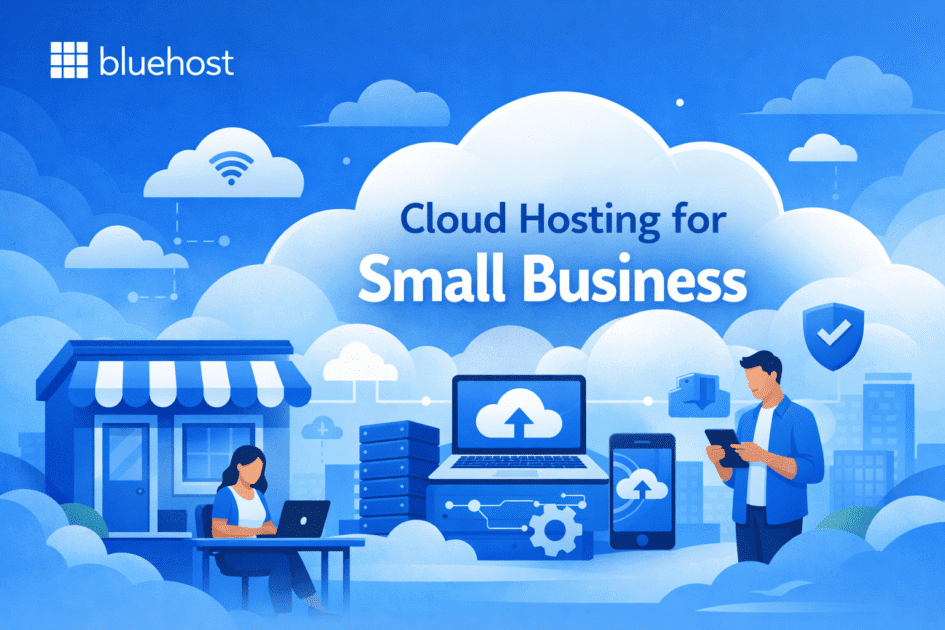Key highlights
- Learn what cloud for small business really means – beyond just online storage.
- Discover top benefits like cost savings, remote access and faster innovation.
- Compare the top 10 corporate cloud platforms for 2026.
- Know when to choose cloud storage vs full cloud infrastructure.
- Find out why Bluehost is the smart cloud choice for growing businesses.
Still relying on old-school IT setups to run your business? That might be slowing you down. Today, where agility, automation and scale define success, cloud for small business is no longer optional – it’s essential.
The cloud computing market continues to grow significantly, with spending on cloud services expected to increase substantially in the coming years. Why? Because the cloud for business isn’t just storage. It’s the digital engine driving smarter, faster and more scalable growth.
For every business, small or enterprise level, the cloud helps you stay agile, save costs and tap into AI-powered tools without maintaining bulky physical servers.
In this guide, you’ll discover:
- What does “cloud for small business” really mean? (Hint: It’s more than Dropbox or Google Drive)
- Why are startups to enterprises ditching traditional IT setups?
- When to choose cloud storage vs full cloud infrastructure?
- What are the top corporate cloud platforms for 2026?
- How to choose a cloud provider that actually fits your goals?
If you are ready to future-proof your business and scale smarter, not harder, let’s continue reading.
What is cloud for small business and why does it matter?
Cloud for small business refers to using internet-based services, like data storage, applications and infrastructure, to power your company’s operations. Instead of relying on bulky physical servers or expensive hardware, businesses can now access powerful tools and platforms directly from the cloud. But it’s not just about storage.
Here’s what it really includes:
- Cloud storage: Think Dropbox, Google Drive or OneDrive for storing and sharing files.
- Cloud computing: Running applications and workloads on virtual machines instead of local servers.
- Cloud services: A broad range of tools, including customer relationship management, analytics, AI tools and more.
These services are delivered via three main models:
- IaaS (Infrastructure as a Service): Rent servers and storage (for example: AWS, Azure)
- PaaS (Platform as a Service): Build apps without managing the underlying hardware (for example: Google App Engine)
- SaaS (Software as a Service): Use cloud-hosted apps like Salesforce, Slack or Microsoft 365
Whether you’re a small business or a medium-sized company, moving to a cloud-based infrastructure means:
- Lower upfront costs
- Faster performance
- Easy scalability
- Remote access and collaboration
- Built-in cloud security
Cloud for business not just a tech upgrade – it’s a smarter, more agile way to run your business. Let’s learn more about the benefits of using the cloud.
What are the key benefits of using the cloud for small companies?
If you’re still debating the move to the cloud, here’s what modern businesses are already gaining:
1. Cost optimization and predictable pricing
With cloud for small business, you skip the high upfront investment of physical servers. Most platforms offer pay-as-you-go pricing, letting you scale costs with usage. This makes the cloud highly cost effective for small and medium-sized businesses and enterprises alike.
2. Operational flexibility and remote access
Cloud services let your team work from anywhere with just an internet connection. Accessing customer data, dashboards or files – it’s all available in real-time, improving operational efficiency across departments.
3. Data security and compliance readiness
Leading cloud providers invest heavily in enterprise-grade security, encryption and compliance certifications like GDPR, HIPAA and SOC2. Your sensitive information is protected across availability zones, backed by automated data backups and role-based access.
4. Business continuity and disaster recovery
With geo-redundant data centers and automated disaster recovery protocols, the cloud helps businesses stay resilient even during outages or cyberattacks. You don’t just protect against data loss; you ensure uninterrupted operations.
5. Faster innovation
Want to integrate artificial intelligence, data analytics or even generative AI? Cloud platforms make these tools accessible without massive infrastructure. You can now automate tasks, process large volumes of data and launch new services faster than ever.
When done right, cloud for companies boosts productivity, improves website performance and gives your company the power to grow with confidence. But should you choose cloud storage or cloud infrastructure is the question.
Read more:Benefits of Cloud Hosting | Exploring the Key Advantages of Bluehost Cloud
Cloud storage vs. Cloud infrastructure: What’s right for you?
Choosing between cloud storage and full cloud infrastructure depends on your business needs, scale and technical goals.
When cloud storage is enough?
If your main need is file storage, document sharing or backup, basic cloud-based services like Google Drive, OneDrive or Dropbox might be all you need.
Ideal for:
- File sharing across teams
- Online storage of documents
- Small businesses or solo entrepreneurs
- Low technical maintenance
Features include:
- Easy syncing across devices
- Collaboration tools
- Automatic version control
When you need cloud infrastructure?
As your business grows, so do your digital needs. That’s where cloud computing platforms like AWS, Microsoft Azure or Google Cloud come in. They offer full-stack cloud-based infrastructure, including virtual machines, databases and web services.
Ideal for:
- Hosting apps, websites and custom platforms
- Scaling customer relationship management systems
- Running AI capabilities and machine learning models
- Handling critical data across regions
Features include:
- On-demand compute power
- Global data center networks
- Deep integration with analytics and automation tools
What about hybrid models?
Some companies prefer a mix. Using cloud storage for general operations and adopting cloud platforms for development or hosting. This is especially common among medium-sized businesses balancing costs, security and flexibility.
Here’s a quick comparison table for scanning and summarizing cloud storage vs cloud infrastructure:
| Feature | Cloud storage | Cloud infrastructure |
|---|---|---|
| Primary Use | File storage and sharing | Hosting apps, websites, full-scale operations |
| Examples | Google Drive, Dropbox, OneDrive | AWS, Microsoft Azure, Google Cloud |
| Ideal for | Small teams, basic storage needs | Scaling startups, medium to large businesses |
| Deployment complexity | Very low – ready to use | Moderate to high – may need IT setup |
| Customizability | Limited | Highly customizable with virtual machines, APIs |
| Cost structure | Subscription or freemium | Pay-as-you-go, scalable billing |
| Security features | Basic encryption, access control | Enterprise-grade security, compliance-ready |
| Scalability | Limited | High – supports multiple cloud providers, autoscaling |
| Integration | Standard business tools (Docs, Sheets) | Full stack apps, data analytics, AI capabilities |
| Best for | File backups, document storage | Full cloud for small business operations, automation |
With this, you now know what’s best for you. Let us also look at some case studies of how business grade cloud hosting has helped people.
Real-world use cases: How does business-grade cloud hosting help?
Here are examples of a few businesses that made the most use of corporate cloud platforms to grow and scale.
1. Netflix

Netflix moved its entire infrastructure to the cloud to support its global streaming service. It used auto-scaling cloud servers, multiple availability zones and data analytics tools. This helped Netflix ensure seamless streaming, reduced downtime and faster content delivery to over 230 million users worldwide.
Cloud benefit: Elastic scalability, high availability and better user experience at massive scale.
2. Slack

Slack used business grade cloud hosting from day one to host its real-time messaging app. The company took advantage of managed cloud services like EC2 and S3 to support millions of users daily. This enabled rapid deployment, minimal downtime and consistent performance, even during viral growth phases.
Cloud benefit: Fast go-to-market, reliable uptime and simplified infrastructure management.
3. Samsung

Samsung successfully migrated over 1 billion user accounts to the cloud, significantly reducing database costs and improving system reliability. With enterprise-grade cloud infrastructure, they now manage critical customer data with better efficiency, resilience and lower latency across regions.
Cloud benefit: Improved data storage, cost optimization and global data access without performance lag.
Top 10 corporate cloud platforms for businesses in 2026
Choosing the right cloud for small business starts with understanding your options. From small businesses to enterprise-grade operations, here are the top players leading the cloud landscape this year.
| Provider | Best for | Known for | Ease of use |
|---|---|---|---|
| Bluehost | Small to mid-sized businesses | Managed cloud, WordPress integration | ⭐⭐⭐⭐⭐ (Very easy) |
| AWS | High-growth startups and enterprises | Scalability, global reach | ⭐⭐ (Developer-heavy) |
| Microsoft Azure | Enterprise solutions and AI capabilities | Hybrid cloud, security | ⭐⭐⭐ |
| Google Cloud | Data-heavy and ML-driven companies | AI/ML tools, analytics | ⭐⭐⭐⭐ |
| Hostinger | Startups with tight budgets | Affordable cloud hosting | ⭐⭐⭐⭐ |
| Liquid Web | Ecommerce, healthcare and SaaS | White-glove support | ⭐⭐⭐ |
| SiteGround | WordPress-based businesses | Excellent support, managed cloud | ⭐⭐⭐⭐⭐ |
| DigitalOcean | Developer-focused startups | Droplets, CLI flexibility | ⭐⭐ |
| Kamatera | Custom infrastructure needs | Instant scaling, server customization | ⭐⭐⭐ |
| ScalaHosting | Businesses needing private VPS control | SPanel, affordable VPS options | ⭐⭐⭐⭐ |
Entering a new business or modernizing legacy systems, these corporate cloud platforms offer strong foundations for any business model. From high-performance infrastructure to AI-ready tools, there’s a solution for every growth stage.
With multiple options, choosing Bluehost allows you to grow without having much technical knowledge and that too at a low cost.
With our business-grade cloud hosting, we offer a fully managed environment. This allows startups, solopreneurs and small businesses to focus on growth and not server management. We combine the flexibility of cloud infrastructure with the simplicity of shared hosting, making it perfect for businesses that want power without complexity.
Here’s why Bluehost is a smart choice for 2026:
- Startup-friendly onboarding: Intuitive UI, pre-integrated tools and 1-click app installs
- Scalable cloud VPS: Grow from MVP to full-scale business without migrating platforms
- 24/7 expert support: Real humans, ready to help at every step
- Built-in security features: Malware protection, automatic backups and DDoS defense
- Optimized for performance: Fast loading speeds, high uptime and global availability
Start simple with Bluehost’s cloud for small business and upgrade as your demands grow. It’s cloud, made easy.
How to choose the right cloud provider for your business?
Not all cloud platforms are built the same and your business deserves one that fits your needs, not someone else’s checklist. Here’s what to consider before making the switch:
- How technical is your team?
Go for fully managed solutions if you lack in-house IT.
- What’s your growth plan?
Need to scale fast? Look for platforms with auto-scaling and on-demand resources.
- What level of support do you need?
Choose providers with 24/7 support and migration assistance if you’re just starting out.
- Are there industry-specific needs?
Healthcare, eCommerce and finance may require HIPAA/GDPR-compliant infrastructure.
- What’s your budget?
Predictable pricing and pay-as-you-grow models help avoid overspending early on.
If you’re a founder who values simplicity, speed and strong support, Bluehost hits the sweet spot between performance and ease of use.
Final thoughts
Cloud isn’t just a tech upgrade; it’s a smarter way to run your business.
From keeping costs predictable to making your data accessible from anywhere, the cloud for small business helps you stay flexible, secure and ready to grow. If you’re looking for a provider that balances ease of use, support and scalability, Bluehost is a great place to begin.
- Set up quickly
- Get expert help anytime
- Scale without the stress
Start your cloud journey with Bluehost Cloud Hosting – built for businesses that want to grow smarter.
FAQs
Cloud for business refers to using cloud platforms, storage and tools to run operations, store data and scale efficiently, without managing physical servers.
Prices vary by provider. On average, 1 TB ranges from $6 to $25/month, depending on whether it’s basic storage or part of a larger business suite.
Cloud computing allows businesses to access servers, storage and applications over the internet. This helps in improving speed, flexibility and cost-efficiency.
The four main cloud services are:- IaaS (Infrastructure as a Service)- PaaS (Platform as a Service)- SaaS (Software as a Service)- FaaS (Function as a Service/serverless)
The three leading providers are:1. Bluehost2. Amazon Web Services (AWS)3. Microsoft Azure
Software as a Service (SaaS) is a cloud model where software is accessed via the internet – no downloads or local installations are needed.
Public cloud, private cloud, hybrid cloud and community cloud are the 4 basic models to choose from for your business.
Providers like Bluehost, Kamatera and IBM Cloud offer customizable private cloud solutions for enhanced control and security.



Write A Comment